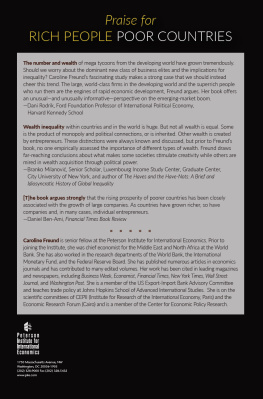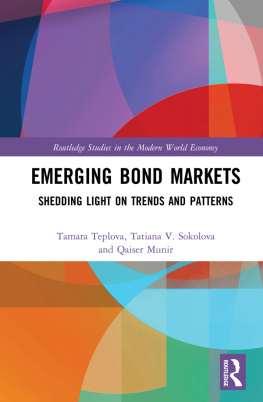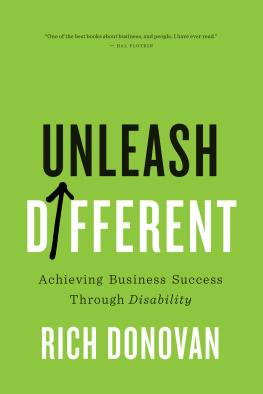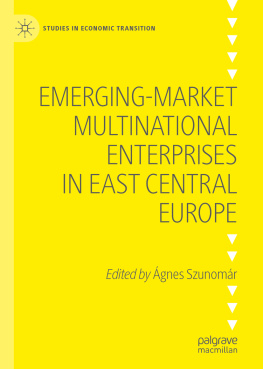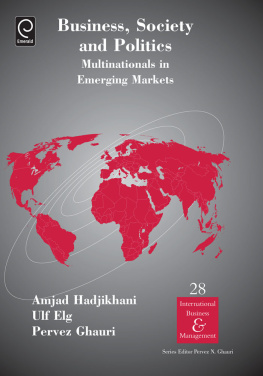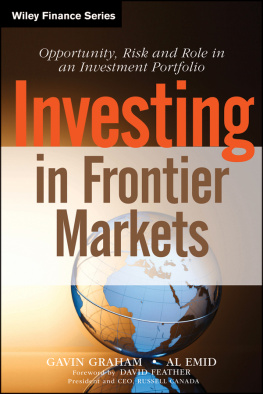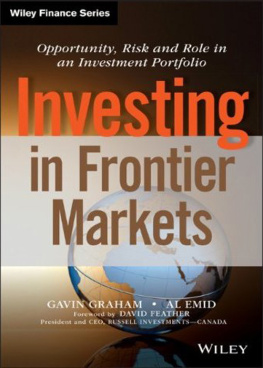Freund - Rich people poor countries: the rise of emerging-market tycoons and their mega firms
Here you can read online Freund - Rich people poor countries: the rise of emerging-market tycoons and their mega firms full text of the book (entire story) in english for free. Download pdf and epub, get meaning, cover and reviews about this ebook. City: Developing countries;Washington (D.C, year: 2016;2015, publisher: Peterson Institute for International Economics, genre: Politics. Description of the work, (preface) as well as reviews are available. Best literature library LitArk.com created for fans of good reading and offers a wide selection of genres:
Romance novel
Science fiction
Adventure
Detective
Science
History
Home and family
Prose
Art
Politics
Computer
Non-fiction
Religion
Business
Children
Humor
Choose a favorite category and find really read worthwhile books. Enjoy immersion in the world of imagination, feel the emotions of the characters or learn something new for yourself, make an fascinating discovery.
- Book:Rich people poor countries: the rise of emerging-market tycoons and their mega firms
- Author:
- Publisher:Peterson Institute for International Economics
- Genre:
- Year:2016;2015
- City:Developing countries;Washington (D.C
- Rating:5 / 5
- Favourites:Add to favourites
- Your mark:
- 100
- 1
- 2
- 3
- 4
- 5
Rich people poor countries: the rise of emerging-market tycoons and their mega firms: summary, description and annotation
We offer to read an annotation, description, summary or preface (depends on what the author of the book "Rich people poor countries: the rise of emerging-market tycoons and their mega firms" wrote himself). If you haven't found the necessary information about the book — write in the comments, we will try to find it.
Freund: author's other books
Who wrote Rich people poor countries: the rise of emerging-market tycoons and their mega firms? Find out the surname, the name of the author of the book and a list of all author's works by series.
Rich people poor countries: the rise of emerging-market tycoons and their mega firms — read online for free the complete book (whole text) full work
Below is the text of the book, divided by pages. System saving the place of the last page read, allows you to conveniently read the book "Rich people poor countries: the rise of emerging-market tycoons and their mega firms" online for free, without having to search again every time where you left off. Put a bookmark, and you can go to the page where you finished reading at any time.
Font size:
Interval:
Bookmark:
RICH PEOPLE
POOR COUNTRIES
The Rise of
Emerging-Market Tycoons
and their Mega Firms
Caroline Freund
Assisted by Sarah Oliver

Caroline Freund is senior fellow at the Peterson Institute for International Economics. Prior to joining the Institute, she was chief economist for the Middle East and North Africa at the World Bank. She has also worked in the research departments of the World Bank, the International Monetary Fund, and the Federal Reserve Board. She has published numerous articles in economics journals and has contributed to many edited volumes. Her work has been cited in leading magazines and newspapers, including Business Week, Economist, Financial Times, New York Times, Wall Street Journal, and Washington Post. She is a member of the US Export-Import Bank Advisory Committee and teaches trade policy at Johns Hopkins School of Advanced International Studies. She is on the scientific committees of CEPII (Institute for Research of the International Economy, Paris) and the Economic Research Forum (Cairo) and is a member of the Center for Economic Policy Research.
PETERSON INSTITUTE FOR INTERNATIONAL ECONOMICS
1750 Massachusetts Avenue, NW Washington, DC 20036-1903 (202) 328-9000 FAX: (202) 328-5432
www.piie.com
Adam S. Posen, President
Steven R. Weisman, Vice President for Publications and Communications
Cover Design by Peggy Archambault
Cover Photo: Evgeny Sergeev and rasslavaIStock
Printed by Versa Press, Inc.
Copyright 2016 by the Peterson Institute for International Economics. All rights reserved. No part of this book may be reproduced or utilized in any form or by any means, electronic or mechanical, including photocopying, recording, or by information storage or retrieval system, without permission from the Institute.
For reprints/permission to photocopy please contact the APS customer service department at Copyright Clearance Center, Inc., 222 Rosewood Drive, Danvers, MA 01923; or email requests to:
Printed in the United States of America
18 17 16 5 4 3 2 1
Library of Congress
Cataloging-in-Publication Data
Freund, Caroline L.
Rich people poor countries: the rise of emerging-market tycoons and their mega firms/Caroline Freund; assisted by Sarah Oliver.
pages cm
Includes bibliographical references.
ISBN 978-0-88132-703-8
eISBN 978-0-88132-704-5
1. Developing countriesEconomic conditions. 2. Nouveau richeDeveloping countries. 3. EntrepreneurshipDeveloping countries. 4. EqualityDeveloping countries. 5. Income distributionDeveloping countries. I. Title.
HC59.7.F696 2015
338.90091724dc23
2015017553
This publication has been subjected to a prepublication peer review intended to ensure analytical quality. The views expressed are those of the author. This publication is part of the overall program of the Peterson Institute for International Economics, as endorsed by its Board of Directors, but it does not necessarily reflect the views of individual members of the Board or of the Institutes staff or management.
The Peterson Institute for International Economics is a private nonpartisan, nonprofit institution for rigorous, intellectually open, and indepth study and discussion of international economic policy. Its purpose is to identify and analyze important issues to make globalization beneficial and sustainable for the people of the United States and the world, and then to develop and communicate practical new approaches for dealing with them.
Its work is funded by a highly diverse group of philanthropic foundations, private corporations, and interested individuals, as well as income on its capital fund. About 35 percent of the Institutes resources in its latest fiscal year were provided by contributors from outside the United States. A list of all financial supporters for the preceding four years is posted at http://piie.com/supporters.cfm.
Contents
Tables
Figures
Map
Preface
Policymakers, academics, and the media increasingly view the rising wealth of the top 0.00001 percent of individuals as a problem irrespective of how wealth is accrued. The statistics on the growing number of billionaires in the world and their share of global wealth are indeed stunning: Billionaire wealth has grown over 500 percent in the last 18 years (19962014), while global income has risen only by 148 percent. This raises concerns about a future where the superrich get richer while the poor and middle classes see their wealth (if any) stagnate.
Caroline Freund reminds us that extreme wealth is also in many cases a reward for major innovation, and as a result the growth in extreme wealth can be a sign that things are going very well, depending on who exactly is getting rich. She examines how the richest men and women in the world made their fortunes to understand whether the new superrich are rising innovators or whether their wealth stems from bequests or political connections.
The results are striking. Extreme wealth in emerging markets is growing more rapidly than in advanced countries but unlike advanced countries, where the relative shares of inheritors and self-made billionaires are fairly flat, extreme wealth in emerging markets is dominated by self-made men (and a handful of women). Importantly, within this group of the self-made rich in emerging markets, the fastest growing group is that of the innovators, people building large companies that are intricately linked with global markets. The large-scale entrepreneurs and their businesses are helping to modernize these economies by pulling workers out of rural agriculture and into the urban workforce. In contrast, the advanced countries appear more stagnant in their sources of wealth accumulation, and this parallels growth developments, with the Anglo countries in particular revealing some worrying trends.
Freund presents compelling evidence that the presence of these large global firms founded by innovators is important for everyones economic growth and modernization. She brings together a wealth of recent empirical evidence using firm-level data that show case after case that resource allocation between specific business firms matters for growth. Productivity growth is the result not just of better technologies but also to a great extent of improved resource allocation between firms. Richer countries have a larger share of their workforce in large firms, economic growth is associated with an expansion of large firms, and exports come almost entirely from the largest firms in a country. When the most productive firms employ more capital and labor output expands, there are more jobs, and those jobs pay higher wages.
The important role played by large firms in spurring economic growth goes against the commonly held view that small and medium-sized enterprises are the key to innovation and must be supported by government policies. Similarly, her findings suggest that concerns about the missing middle in the firm size distribution in developing countries are unfounded. In fact, what developing economies need are export-superstar large firms. The argument made in this book is that productivity growth requires that resources flow seamlessly to the most productive firms allowing these firms to grow large. This does not mean that governments should favor large firmsease of firm entry is important, so new firms can enter and grow rapidly if they are competitivejust that there must not be constraints limiting the growth of the most productive firms. Openness to trade is also critical because it guides resources to their most productive uses and offers a market large enough for competitive firms to grow into. An improved business climate and openness to trade have facilitated the rise of big business (and its accompanying group of wealthy entrepreneurs) in all of the successful industrializations of the past and is seen in the growth success stories (and emerging-market billionaires) of today. Freunds exciting empirical analysis derived from corporate performance today evokes comparisons to economic development of the US Gilded Age of the late 19th century, suggesting that emerging economies need tycoons in order to rise.
Next pageFont size:
Interval:
Bookmark:
Similar books «Rich people poor countries: the rise of emerging-market tycoons and their mega firms»
Look at similar books to Rich people poor countries: the rise of emerging-market tycoons and their mega firms. We have selected literature similar in name and meaning in the hope of providing readers with more options to find new, interesting, not yet read works.
Discussion, reviews of the book Rich people poor countries: the rise of emerging-market tycoons and their mega firms and just readers' own opinions. Leave your comments, write what you think about the work, its meaning or the main characters. Specify what exactly you liked and what you didn't like, and why you think so.

